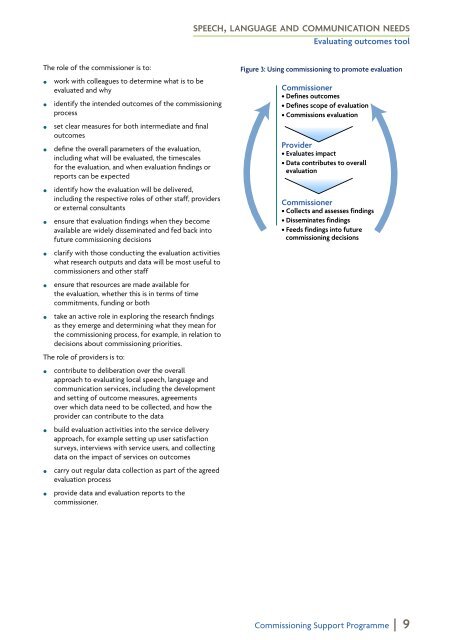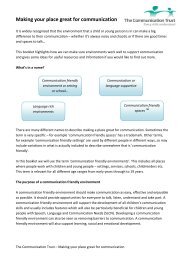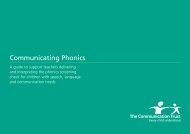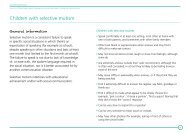Speech, language and communication needs: Evaluating outcomes ...
Speech, language and communication needs: Evaluating outcomes ...
Speech, language and communication needs: Evaluating outcomes ...
Create successful ePaper yourself
Turn your PDF publications into a flip-book with our unique Google optimized e-Paper software.
speech, <strong>language</strong> <strong>and</strong> <strong>communication</strong> <strong>needs</strong><br />
<strong>Evaluating</strong> <strong>outcomes</strong> tool<br />
The role of the commissioner is to:<br />
• work with colleagues to determine what is to be<br />
evaluated <strong>and</strong> why<br />
• identify the intended <strong>outcomes</strong> of the commissioning<br />
process<br />
• set clear measures for both intermediate <strong>and</strong> final<br />
<strong>outcomes</strong><br />
• define the overall parameters of the evaluation,<br />
including what will be evaluated, the timescales<br />
for the evaluation, <strong>and</strong> when evaluation findings or<br />
reports can be expected<br />
• identify how the evaluation will be delivered,<br />
including the respective roles of other staff, providers<br />
or external consultants<br />
• ensure that evaluation findings when they become<br />
available are widely disseminated <strong>and</strong> fed back into<br />
future commissioning decisions<br />
• clarify with those conducting the evaluation activities<br />
what research outputs <strong>and</strong> data will be most useful to<br />
commissioners <strong>and</strong> other staff<br />
• ensure that resources are made available for<br />
the evaluation, whether this is in terms of time<br />
commitments, funding or both<br />
• take an active role in exploring the research findings<br />
as they emerge <strong>and</strong> determining what they mean for<br />
the commissioning process, for example, in relation to<br />
decisions about commissioning priorities.<br />
The role of providers is to:<br />
• contribute to deliberation over the overall<br />
approach to evaluating local speech, <strong>language</strong> <strong>and</strong><br />
<strong>communication</strong> services, including the development<br />
<strong>and</strong> setting of outcome measures, agreements<br />
over which data need to be collected, <strong>and</strong> how the<br />
provider can contribute to the data<br />
• build evaluation activities into the service delivery<br />
approach, for example setting up user satisfaction<br />
surveys, interviews with service users, <strong>and</strong> collecting<br />
data on the impact of services on <strong>outcomes</strong><br />
• carry out regular data collection as part of the agreed<br />
evaluation process<br />
• provide data <strong>and</strong> evaluation reports to the<br />
commissioner.<br />
Figure 3: Using commissioning to promote evaluation<br />
Commissioner<br />
• Defines <strong>outcomes</strong><br />
• Defines scope of evaluation<br />
• Commissions evaluation<br />
Provider<br />
• Evaluates impact<br />
• Data contributes to overall<br />
evaluation<br />
Commissioner<br />
• Collects <strong>and</strong> assesses findings<br />
• Disseminates findings<br />
• Feeds findings into future<br />
commissioning decisions<br />
Commissioning Support Programme | 9

















